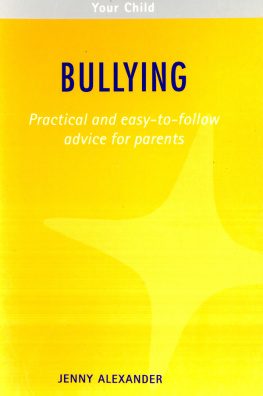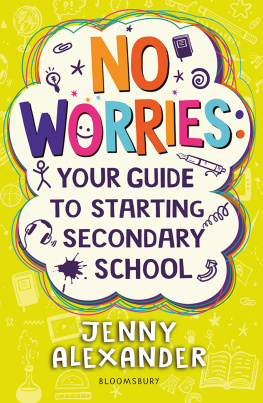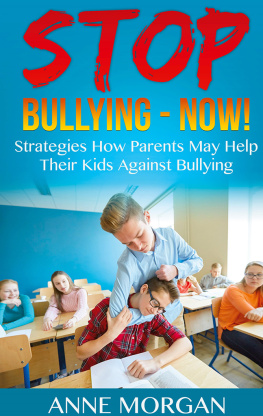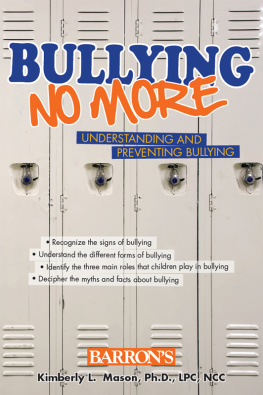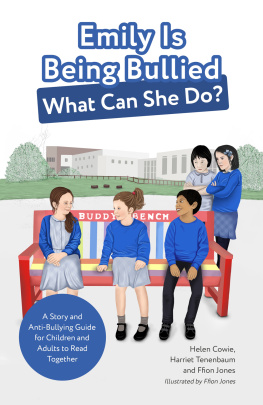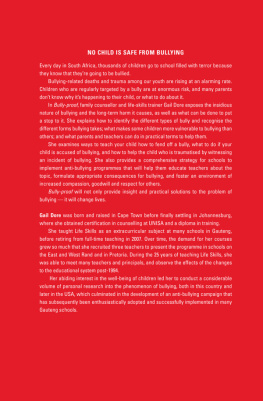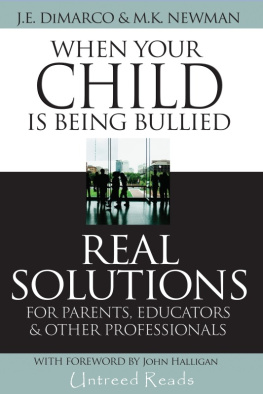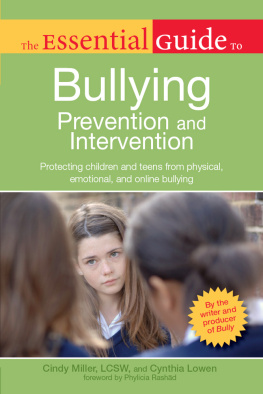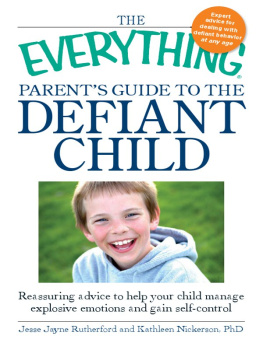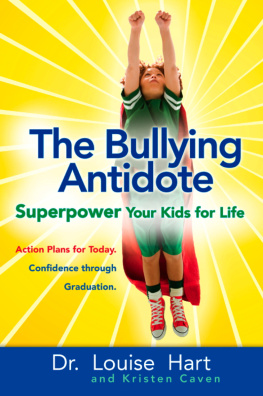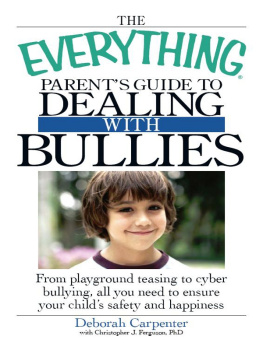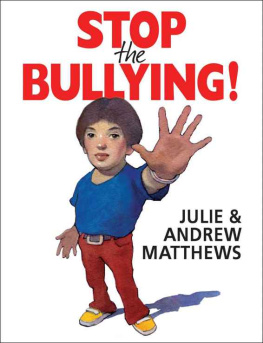Jenny Alexander - Bullying: Practical and easy-to-follow advice for parents
Here you can read online Jenny Alexander - Bullying: Practical and easy-to-follow advice for parents full text of the book (entire story) in english for free. Download pdf and epub, get meaning, cover and reviews about this ebook. year: 2016, publisher: Pavilion Books, genre: Children. Description of the work, (preface) as well as reviews are available. Best literature library LitArk.com created for fans of good reading and offers a wide selection of genres:
Romance novel
Science fiction
Adventure
Detective
Science
History
Home and family
Prose
Art
Politics
Computer
Non-fiction
Religion
Business
Children
Humor
Choose a favorite category and find really read worthwhile books. Enjoy immersion in the world of imagination, feel the emotions of the characters or learn something new for yourself, make an fascinating discovery.
- Book:Bullying: Practical and easy-to-follow advice for parents
- Author:
- Publisher:Pavilion Books
- Genre:
- Year:2016
- Rating:5 / 5
- Favourites:Add to favourites
- Your mark:
- 100
- 1
- 2
- 3
- 4
- 5
Bullying: Practical and easy-to-follow advice for parents: summary, description and annotation
We offer to read an annotation, description, summary or preface (depends on what the author of the book "Bullying: Practical and easy-to-follow advice for parents" wrote himself). If you haven't found the necessary information about the book — write in the comments, we will try to find it.
Bullying: Practical and easy-to-follow advice for parents — read online for free the complete book (whole text) full work
Below is the text of the book, divided by pages. System saving the place of the last page read, allows you to conveniently read the book "Bullying: Practical and easy-to-follow advice for parents" online for free, without having to search again every time where you left off. Put a bookmark, and you can go to the page where you finished reading at any time.
Font size:
Interval:
Bookmark:
Jenny Alexander is a childrens author who in the last few years has written many books on real-life issues. Faced with the problem of bullying, Jenny and her children looked for creative and effective ways of coping, and Your Child: Bullying grew naturally out of that experience.
A series of books containing easy-to-follow, practical advice for the parents of children with a variety of illnesses or conditions.
Each book provides a clear overview of the situation, explaining essential information about the illness or condition and outlining the practical steps parents and carers can take to help understand, support and care for their child, the rest of the family as well as themselves. Guiding parents through the conventional, the complementary and the alternative approaches available, these books cater for children of all ages, ranging from babies to teenagers, and enable the whole family to move forward in a positive way.
Asthma, Erika Harvey
Bullying, Jenny Alexander
Dyslexia, Robin Temple
Epilepsy, Fiona Marshall
Headaches & Migraine, Maggie Jones
Your Child
Practical and easy-to-follow edvice for parents
JENNY ALEXANDER

Children are educated by what the
grown-up is, and not by what he says.
C G Jung (Collected Works, Vol. 9)
I should like to thank all the authors whose work on so many different subjects has contributed to my understanding of the bullying problem over the years. I am particularly grateful to Susan Jeffers for giving me permission to use her pushing back your boundaries and to Penny Parks for her inner child rescue scene.
Thanks also to Routledge and Princeton University Press for permission to use the quotation from C G Jung.
I am grateful to my agent, Sara Menguc, and my publisher, without whose faith and enthusiasm this book would not have been written.
I want to thank my husband, Ian, for his unfailing friendship and support.
But most of all, I thank my children, whose experience of bullying has taught me so much about my own.
I want to say at the outset that this is not a general book on the subject of bullying its a self-help book for parents whose children are being bullied. It does not contain any facts and figures, statistics and psychological profiles, because its subject is the practical day-to-day challenge of helping your child to cope with bullying.
If this book had been available when my child was being bullied, I think it could have saved my family several months of acute anxiety and pain. Thats why Im writing it for you.
Bullying is a shocking problem. First, theres the shock of finding out how unutterably cruel children can be to each other. Then, for parents, theres the shock of suddenly having to deal with a child under extreme stress and, finally, theres the shock of discovering that when your child is being bullied you become a victim, too.
His unhappiness makes you unhappy; his fear makes you afraid. If he dreads going to school, you dread sending him. You feel the same impotent anger about the situation hes in; towards the people who are making him suffer, you feel the same murderous hate.
I didnt want my child to be a victim and I didnt want to be one either. So I wrote off to all the bullying organizations and ordered all the recommended books, looking for ideas about how to take effective action.
I found that the conventional advice to parents falls into two main categories how to get your childs school to help, and how to get your child to help himself.
As soon as my husband and I opened a dialogue with the school it occurred to me that even if they managed to stop the bullying our child would still be vulnerable. Children who have been bullied are likely to be bullied again, simply because a precedent has been set. Children who are bullied repeatedly become less and less able to defend themselves. It was up to the school to sort out the current situation, but it was up to my child to learn to stay safe.
Unfortunately, most of the advice I found about what to tell a bullied child seemed to be either so obvious that he would already be doing it like avoiding the places where the people doing the bullying hung out or else, quite frankly, impractical. It was only because I couldnt think what else to do that I tried it, and I certainly wish I hadnt.
It might sound fine in theory to say that bullied children should tell a teacher, pretend they dont care, act more assertively, join clubs and make new friends, but, as you will probably know if your child is being bullied, these are not real options for children whose self-esteem has taken a battering. Asking fragile children to do such things is setting them up for failure, and their failure will just make you feel more frustrated and helpless than ever.
I reached the conclusion that the conventional approach trying to get bullied children to change their behaviour without first addressing their feelings was putting the cart before the horse. It was pointless to ask children who felt bad about themselves to pretend they didnt, but if they felt good about themselves their behaviour would automatically change anyway. So how could you make someone feel good about himself? I didnt know, but I knew how to find out.
Back to the bookshops and library I went, this time looking not for books on bullying, but for books on positive thinking, building self-esteem and coping with the high levels of anger and fear my child was feeling.
These books, which I should never have dreamed of reading before, turned out to be packed with uplifting anecdotes, memorable quotations and practical exercises. I was sure the ideas in them could help my child, but they were all adult books and I couldnt find anything similar written for children.
I decided to try the ideas out for myself. After all, I was a victim, too. I had my own unhappiness, fear and anger about the bullying situation to deal with. If my child wanted to join in, too, he could, because I would explain what I was doing as I went along.
I started with positive thinking: it looked as if it would be easy and fun. I explained it to my children in terms of positive and negative words, and to illustrate the point I suggested we try to use only positive words for a whole mealtime. It was a sort of game.
We all enjoyed it, and the children wanted to know more. Over the next few weeks the older ones got stuck into some of the less complicated books, and even the younger two, then aged eight and six, had no difficulty at all in grasping the essentials.
Positive thinking helped the whole family to feel calmer and more in control, and that meant our house became a better environment for reviving our bullied childs failing optimism and zest for life.
We went on to consider ways of creating an environment that would be particularly nurturing to self-esteem, and we looked at how to meet the challenge of coping with unusually high levels of fear and anger in more robust and positive ways.
The programme we developed worked surprisingly well. I had hoped that it would help my child feel happier and more self-confident, and that coping better with the teasing that was still going on would mean he didnt bring so much stress home into the family. I had also hoped that it would make me feel less of a victim myself.
In the event, it achieved much more. Because what I had failed to anticipate was that as soon as the bullying stopped mattering so much to my child, it would stop.
Next pageFont size:
Interval:
Bookmark:
Similar books «Bullying: Practical and easy-to-follow advice for parents»
Look at similar books to Bullying: Practical and easy-to-follow advice for parents. We have selected literature similar in name and meaning in the hope of providing readers with more options to find new, interesting, not yet read works.
Discussion, reviews of the book Bullying: Practical and easy-to-follow advice for parents and just readers' own opinions. Leave your comments, write what you think about the work, its meaning or the main characters. Specify what exactly you liked and what you didn't like, and why you think so.

